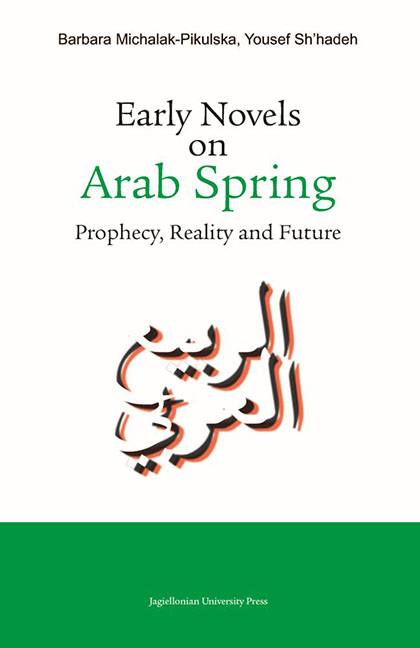Book contents
- Frontmatter
- Contents
- Introduction
- Part I Awakening of the Awareness of Subjugation – The Prophecy of the Spring of Nations in Arab Novels
- Part II At the Heart of the Arab Spring Events
- Part III The Future: The Spring Continues
- 17 Mu‘Taṣim Aš - Šā‘Ir : Uhzūǧat ar-raḥīl (A Song of Departure) and Fī intiẓār as-sulaḥfāt (Waiting for a Turtle)
- 18 Aḥmad ‘Abd Al - Malik : Al-Aqni‘a (Masks)
- 19 Ṭayba Aš - Šarīf Al - Idrīsī : Ḥaǧar min saqar (A Stone from Hell)
- 20 Amīra Aš - Širbīnī : ‘Itq (Liberation)
- 21 ‘ Izz Ad - Dīn Šukrī Fašīr : Bāb al-ẖurūǧ – risālat ‘Alī al-muf‘ama bi-bahǧa ġayr mutawaqqa‘a (The Gate to Leave – Ali’s Letter Filled with Unexpected Joy)
- Conclusion
- Bibliography
- Summary in Arabic
Conclusion
Published online by Cambridge University Press: 13 October 2023
- Frontmatter
- Contents
- Introduction
- Part I Awakening of the Awareness of Subjugation – The Prophecy of the Spring of Nations in Arab Novels
- Part II At the Heart of the Arab Spring Events
- Part III The Future: The Spring Continues
- 17 Mu‘Taṣim Aš - Šā‘Ir : Uhzūǧat ar-raḥīl (A Song of Departure) and Fī intiẓār as-sulaḥfāt (Waiting for a Turtle)
- 18 Aḥmad ‘Abd Al - Malik : Al-Aqni‘a (Masks)
- 19 Ṭayba Aš - Šarīf Al - Idrīsī : Ḥaǧar min saqar (A Stone from Hell)
- 20 Amīra Aš - Širbīnī : ‘Itq (Liberation)
- 21 ‘ Izz Ad - Dīn Šukrī Fašīr : Bāb al-ẖurūǧ – risālat ‘Alī al-muf‘ama bi-bahǧa ġayr mutawaqqa‘a (The Gate to Leave – Ali’s Letter Filled with Unexpected Joy)
- Conclusion
- Bibliography
- Summary in Arabic
Summary
The concept of Arab Spring literature is very broad and ambiguous. In this work, we use it to refer to the phenomena that first appeared in Arabic literature after 2011, that is, after the beginning of the uprisings for freedom and democracy in the Arab countries of North Africa.
Revolutionary prose shows various aspects of human experience, such as persecution or torture, and is oftentimes considered to give a close account of the events that actually transpired, akin to a diary entry. Thanks to their works, Arabic writers have contributed to shaping the minds of a vast audience. The novels present a picture of the uprisings and the revolutionaries that corresponds with the awareness and sensitivity of readers. In addition, they attempt to give a detailed description of the feelings, thoughts and fears of ordinary citizens. Finally, they show the universal fragility of human existence and ideals.
The novels under discussion also show the attitudes of people cooperating with the regimes, who were able to settle themselves well at the expense of the dignity of others. The result of their actions was inevitably the harm of fellow citizens. Such attitudes have been clearly stigmatized by the writers. The authors emphasize that everyone can be tortured or killed, but will be followed by another who will rebel. No regime can feel safe and hope that its deeds will go unpunished. Sooner or later it will be held responsible for its actions. There is still a lot of badness and depravity in Arab countries; and unfortunately, lies, lawlessness and strength still rule.
The risings of the Arab nations, however, did not fully achieve their goals because the counter-revolutionary forces did not give up that easily. The Egyptian thinker Ǧalāl Amīn writes about the media in his country, which regained their character from the period of the Mubarak regime:
How is it possible that just ten months after the outbreak of the revolution, the regime’s media in Egypt are returning to their old habits of cheating people and rebelling against each other? The former type of editor-in-chief of state newspapers and the presidents of their boards have returned.
- Type
- Chapter
- Information
- Early Novels on Arab SpringProphecy, Reality and Future, pp. 157 - 158Publisher: Jagiellonian University PressPrint publication year: 2022

